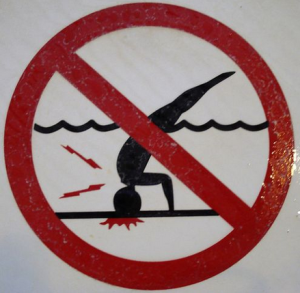“Diving is simply not worth the risk,” says Dr. Herndon Murray, medical director of  Shepherd Center’s SCI program. “The only safe dive is the one you don’t take. This is an entirely preventable catastrophe. Go into water feet first every time.”
Shepherd Center’s SCI program. “The only safe dive is the one you don’t take. This is an entirely preventable catastrophe. Go into water feet first every time.”
Diving is the fourth leading cause of spinal cord injury for men and the fifth for women, according to the National Spinal Cord Injury Statistical Center. Teenagers are especially vulnerable. Surprisingly, one-third of diving injuries happen at the beach when someone runs into the water and dives headfirst into the waves.
Dr. Murray’s advice to go in feet first and, “break a leg, not your neck,” is at the heart of a successful diving injury prevention campaign in the state of Georgia. Over the past ten years, it has cut the number of spinal cord injuries in half.
When you dive, your body is like a torpedo. When you jump in, the body has a more stable base on which to land – and if there is tremendous force, the worst thing that can happen is a broken leg.
Dr. Murray has found that the most effective prevention programs involve schoochildren hearing safety advice from a young person with a diving injury who is now in a wheelchair. “If they hear it from a kid their age…that really sticks with them,” he says.
A school or supervised pool that has a diving coach present is safe, says Dr. Murray. However, he notes that “Japan had so many diving injuries in their schools that they restricted all diving and just about wiped out spinal cord injuries from diving.”
Shepherd Hospital has published a list of ways to help people remember how to prevent SCI from diving:
- The best way is to ALWAYS enter the water feet first.
- Never dive into the shallow end of a pool
- Know that there are often hidden objects in lakes, rivers, etc.
- Avoid alcohol when you’re swimming
- Realize that when you dive, your body is a torpedo cutting through the water and that water may not protect you from a severe impact.
- Just because you used to dive somewhere does not make it safe. You may have grown, and underwater surfaces may have shifted.
Some injuries are caused by hitting the far side of a pool or swimming hole. Depth is not the only thing to be concerned about.
To hear a podcast interview with Dr. Murray on the subject click here.
Leave a Reply